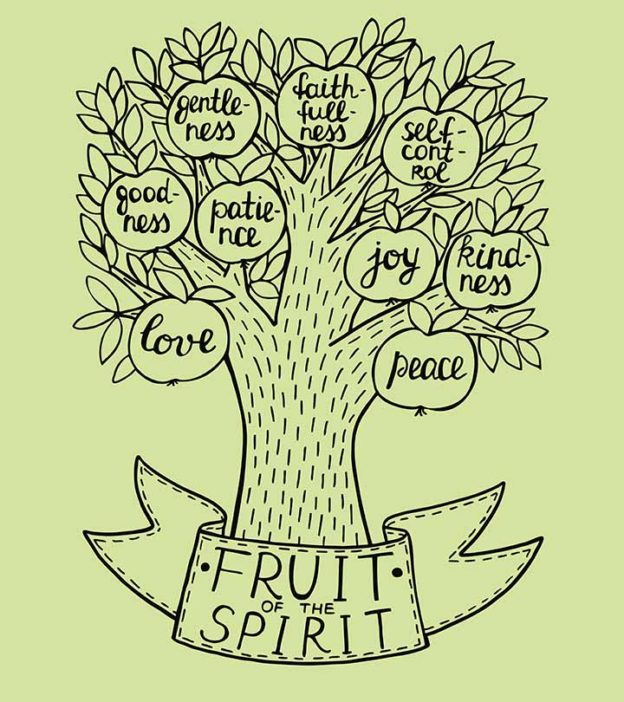
Image: Shutterstock
Explaining the fruit of the spirit for kids ensures they follow the values of Christianity all through their life. Parents need to make their children understand what it is and its significance in the formative years itself for a productive, happy, and content life. Also, following the teachings of Christianity helps them practice good qualities and evolve spiritually.
We bring you this post to help you explain the nine attributes or fruits to your children to have a joyful life ahead.
What Is The Purpose Of The Fruit Of The Spirit?
The term “fruit of the Spirit” is found in Galatians 5:22-23, where Paul talks about how different life is and how better life could be when lived following the Holy Spirit. The following are the exact verses:
“But the fruit of the Spirit is love, joy, peace, patience, kindness, goodness, faithfulness, gentleness, self-control; against such things, there is no law.” The nine fruits of the Spirit are
- Love
- Patience
- Joy
- Peace
- Kindness
- Goodness
- Faithfulness
- Gentleness
- Self-control
These verses guide us to lead a meaningful life and list out the character traits that we must imbibe to come closer to God by seeking happiness not just for ourselves but also for those around us.
The nine qualities listed in the fruit of the Spirit verses help us improve various facets of our lives to evolve into better spiritual beings from the purely physical bodies. Thereby, we also learn to distance ourselves from materialistic wants and desires and open our hearts and souls to the love of God, who fills us with everlasting joy.
How Should You Explain The Fruit Of The Spirit To Kids?
It is vital for children to memorize the verses and put them into practice in their everyday lives.
When the child does not understand what they stand to achieve when they follow a guideline, they are not motivated to follow it. Hence, it is important to explain the purpose of the fruit of the Spirit in ways that they can understand and follow.
Typically, when you look at a Bible class that teaches these concepts, teachers may use music, cards, or other extra resources, such as actual fruits, to discuss these nine qualities.
While it is important for children to learn and memorize the nine qualities, a hands-on approach works wonders in teaching them how to apply these in their lives.
Here are a few simple ideas you can use to teach the fruit of the Spirit to your children effectively.
1. Show it in action
The best way to teach a child something is to show them how it is done. This holds good for the fruit of the Spirit lessons too.
For example, love is one of the fruits of the Spirit mentioned in the verses. Explain to your child how you love them and they love you back and how it makes you both feel happy. Tell them how this feeling must not be restricted to just family but everyone around them as well, including creatures of every kind.
Maybe you can try petting a dog and let your child see how the animal reacts to the loving gesture. You can also explain to them how God loves them unconditionally and is most pleased when they show the same kind of love to everyone and everything around them.
 Quick tip
Quick tip2. Reiterate it
Image: IStock
A lesson stays in mind when it is reiterated and reinforced. With the fruit of the Spirit qualities, the child learns how to implement these fruits in life when they see them applied in various situations. This helps cement the idea in their minds and teaches them how to display these qualities in all aspects of their lives.
For example, patience is a trait that helps us handle stressful situations in life. You can teach them how patiently waiting until Christmas to break open their piggy bank ensures they have saved enough money to buy themselves a bigger present than they could have at the beginning of the year.
3. Help them practice it
Children may come across plenty of situations to practice these qualities in their everyday lives. Therefore, teach them early. Then, they can leverage every such opportunity to practice and show one or many of the important qualities in the situation.
For example, you can demonstrate faithfulness by talking to them about how we expect our family and friends to stick with us through thick and thin, regardless of the situation. Help them see how they rely upon faithful friends and trust them. Teach them to be faithful to everyone and introduce them to the idea of being faithful to Christ and following his teachings regardless of whether anyone’s supervising their actions.
4. Make it a part of your life.
Image: IStock
These fruits must become a part of your life so that the child can learn by watching the family practice these values every day. Make sure to point out to the little one how you display these qualities in every walk of life. It is also vital to help your child understand why you are doing so.
For example, teach them about gentleness as you comfort them when they come to you with a cut or bruise. Talk to them about how a gentle touch can be soothing to someone who is upset or scared and how it can help alleviate the suffering of another. Talk about the soothing power that even a simple touch has.
5. Teach them through pretend play
One of the most interesting pastimes of children is acting out various scenarios of life. Create a scene where you can demonstrate one or more fruits of the Spirit at once and explain to the child why it is important to act in a particular way. You can even pick some stories from the Bible and enact them.
For example, the concept of joy can be elusive to a child, but you can show them how not to lose inner joy no matter what the situation is through pretend play. Create a scene with two characters, both facing adversity. One allows the adversity to affect them deeply and loses their peace. The other holds on to their inner joy and thus breezes through the bad situation, emerging from it unscathed and unaffected. Teach your child how the inner joy that originates from faith in the Lord cannot be eroded no matter what difficulties come our way.
6. Use stories to communicate
Image: IStock
Stories can be a powerful medium for passing on a lesson to your children. Use stories that underline the qualities that you want your child to imbibe. You can pick out their favorite characters to use in your stories and explain what you mean.
For example, superhero cartoons or movies may offer great opportunities to explain what you mean by peace and how peace can help resolve conflict in the best way. Tell your child how violent reactions or strong emotions mess up matters for them in delicate situations by showing how their favorite characters handle such issues calmly and peacefully. Teach them how God, who wields unlimited powers, believes only in peaceful action even while addressing violence.
7. Create opportunities
You may come up with real-life scenarios for the child to put these qualities into practice. Then, while they are at it, you can guide and help them correct their actions.
For example, demonstrate kindness by making it a family tradition to visit the closest nursing home or shelter for the homeless. You may celebrate birthdays or anniversaries or donate something for such people. The child can experience firsthand how a small gesture of kindness or a kind word can bring joy to everyone. Tell them about how showing kindness to all lets us respect every creation of God.
8. Correct them
Children will make mistakes as they grow and encounter people and come across various situations. When they make a mistake, you may teach them the value of the fruit of the Spirit instead of merely rebuking them. Talk to them about which of these qualities they should have exhibited and how it would have helped in the situation.
For example, if they get into a fight at school that ends in fisticuffs, you can explain to the child how self-control in such a situation could have safeguarded them and also the other person, even if the latter did not hold back. Teach them how it takes great power and inner strength to be in control of a tough situation.
 Do remember
Do remember9. Appreciate them for good work
Image: IStock
A lesson for children always works better and stays in the mind when they get appreciation. When they do something good, appreciate them and explain how they have displayed one of the fruits of the Spirit. Tell them how demonstrating these qualities has a ripple effect, prompting others to do the same, thus creating a society filled with positive people.
For example, you can appreciate your child’s goodness when they help someone carry grocery bags to the car or volunteer to help a fellow student with homework. Good deeds always result in the reciprocation of love. Talk about how God has been good to you and your family and how you say thanks for it by being good to others.
Frequently Asked Questions
1. Why is the fruit of the Spirit important?
Learning and accepting the meaning behind the fruit of the Spirit can help live a kind and contented life. If one practices the nine lessons related to the fruit of the Spirit, they become helpful, composed, and gentle individuals while drawing near to God.
2. What does Scripture talk about the fruit of the Spirit?
The Scripture talks about the nine traits or characteristics of the Holy Spirit that we ought to incorporate into our lives. Hence, we should try to become more like Him by being kind, loving, and self-controlled along with the other manifestations (1).
The Holy Spirit is a guiding force for people. The fruit of the spirit is love, patience, joy, peace, kindness, goodness, faithfulness, gentleness, and self-control. These qualities help in the overall and holistic development of a child in all aspects of life. Children should be taught these values in a language that they understand. The fruit of the spirit for kids gives a road map for life to them. The lessons should be illustrated with examples so the children can learn how to implement them in life.
Infographic: What Does the Bible Teach About Different Fruits Of Spirit?
Teaching your children about ‘Fruits of Spirit’ is important as it will help them grow both spiritually and morally. It is also essential to let your children know the Biblical meaning of these fruits. Share this infographic on some Bible verses corresponding to these ‘Fruits of the Spirit’ with your children and enlighten them. Illustration: Momjunction Design Team
Get high-quality PDF version by clicking below.
Download Infographic
Key Pointers
- Fruit of spirits in Christianity comprises certain important virtues for a content life.
- Educate your child about the nine fruits of spirits to help them imbibe and practice these qualities regularly.
- Encouraging your child to practice attributes of love, self-control, kindness, and more such qualities will help them become good individuals.
References:
- What does the Bible say about the fruit of the Spirit?
https://www.denisonforum.org/resources/what-does-the-bible-say-about-the-fruit-of-the-spirit/



















